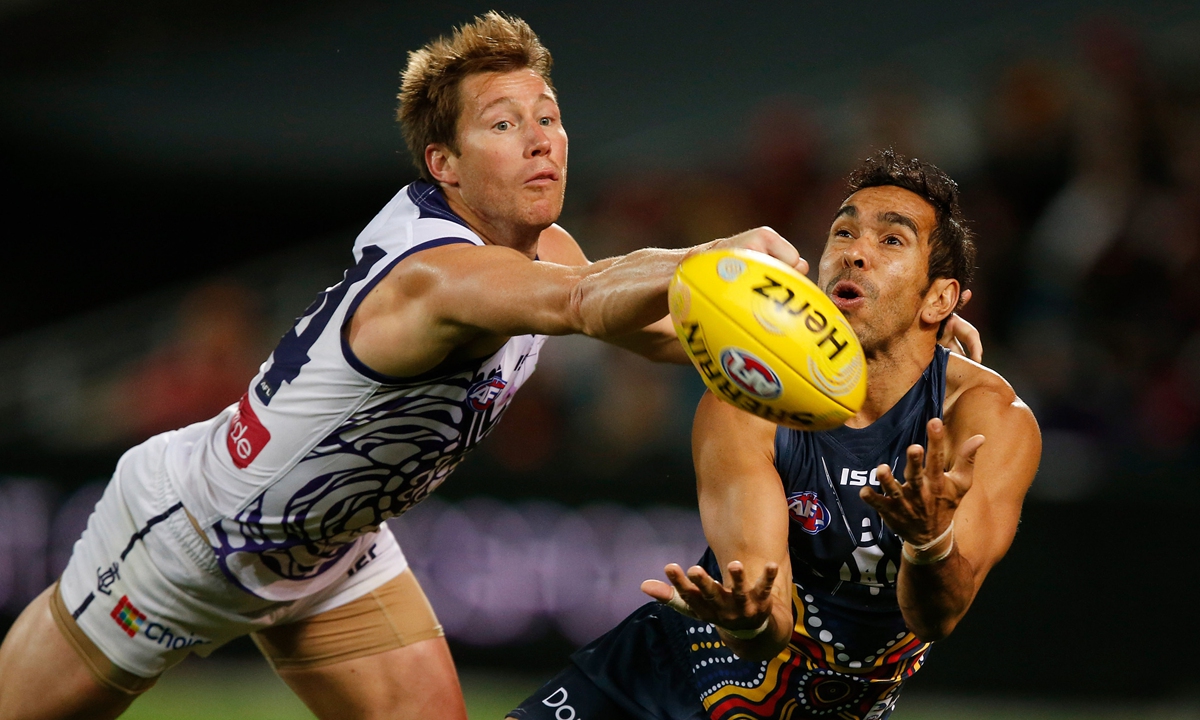‘Why do I keep playing?’
Source:AFP Published: 2020/6/30 18:18:44
Aussie Rules stars stand up against racism

Eddie Betts (right) of the Adelaide Crows marks in front of Lee Spurr of the Adelaide Dockers on May 27, 2017 in Adelaide, Australia. Photo: VCG
Australian Rules teams came together to take a knee in support of the "Black Lives Matter" movement, but ongoing racist attacks show there's still work to do.
Australia's most popular spectator sport, which is similar to Ireland's Gaelic football, has long featured indigenous stars but many have been the target of racism, both on-field and off.
This month veteran Eddie Betts, in his 16th season, was depicted as a monkey in a Twitter post on the very weekend all teams united in support of Black Lives Matter.
That gesture coincided with a wave of protests and renewed awareness around Aboriginal affairs in Australia following the death of African-American George Floyd in police custody in the United States.
Carlton star Betts, who once had a banana thrown at him by a spectator, said the persistent attacks took their toll, but he was prepared to meet them head-on if it led to change.
"It deeply hurts, and you think to yourself, 'Why do I keep playing footy if I keep copping this?' But I want to make a change," he told reporters.
"The way to hurt these guys is keep playing great footy and keep smiling and that's what I love doing."
Melbourne Demons defender Neville Jetta was another on the receiving end of abuse last week, with a social media user posting a monkey emoji in the comment section of his Instagram page.
"This is racism. This needs to stop," his club said, and players' association boss Paul Walsh added, "Another week, another gutless, racist attack on one of our indigenous players. When is enough enough?"
Powerful image
Aussie Rules, which first became a mass-spectator sport in the late 1800s, has long had raucous crowds known for taunting players.
Such behavior was considered part and parcel of the game, but attitudes began changing in the 1990s.
One of the most powerful images associated with racism in Australia is of indigenous St Kilda player Nicky Winmar, who in 1993 responded to abuse from Collingwood supporters by lifting his shirt while facing the crowd and pointing to his skin.
That gesture is often credited as the catalyst to addressing racial vilification in Australian Rules.
Then came Essendon's Michael Long, who in 1995 complained about on-field racial abuse during a clash, also involving Collingwood.
Long received hate mail for speaking up, but his actions sparked change with the Australian Football League (AFL) adopting a ground-breaking policy - rule 30 - that made it an offense for players or officials to insult someone due to their race, religion, ethnicity, color, nationality or background.
The stance was widely lauded, with other sports following suit.
The AFL, which attracts crowds of up to 100,000, has since broadened its "Vilification Framework" to include sexual orientation, while setting out a clearer complaints process.
But underlying problems persist.
'Overt racist attitudes'
Adam Goodes, one of Australia's most high-profile indigenous sportsmen, retired from the AFL in 2015 after being subjected to repeated booing.
Many believed it was racially motivated and stemmed from him taking exception to being called an "ape" by a young spectator two years earlier.
The AFL formally apologized last year for not doing more to defend him, on the eve of the release of a powerful documentary that charted his final years in the sport.
And this month, former player Heritier Lumumba went public with claims that he was routinely called "chimp" by teammates at his club Collingwood during a 10-year stint that ended in 2014.
"When I got into the football club at Collingwood in 2004, it had not updated its definitions of racism. It had not continued on that journey and found ways to prevent the racial discrimination that I faced," he told broadcaster ABC.
Collingwood last week pledged an independent investigation "in an effort to search for the truth."
Paul Briggs, chairman of the AFL Aboriginal and Torres Strait Islander Advisory Council, a body set up to provide advice to the league on issues impacting indigenous players, admitted "there is much work left to do."
But in a statement he also praised the AFL, which last year appointed its first Aboriginal as commissioner while five clubs now have indigenous board members.
"What was the acceptable norm of ignorance and overt racist attitudes in the game is changing fast. The AFL is leading that change," Briggs said.
"Incidents still happen but the racism is identified and addressed by the industry, clubs and the fans much faster and to better effect in the last five years.
"It is important that we build on the momentum and the awareness of the past couple of weeks to continue the change."
RELATED ARTICLES:
Posted in: MISCELLANY